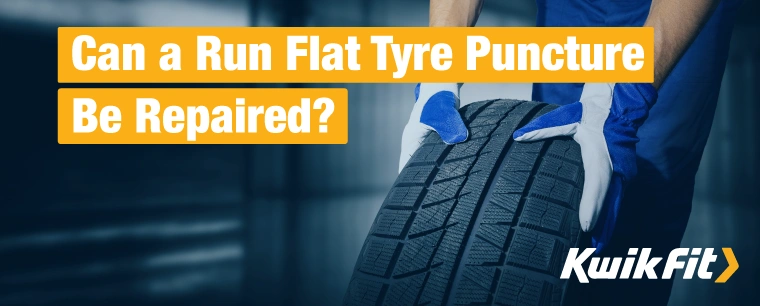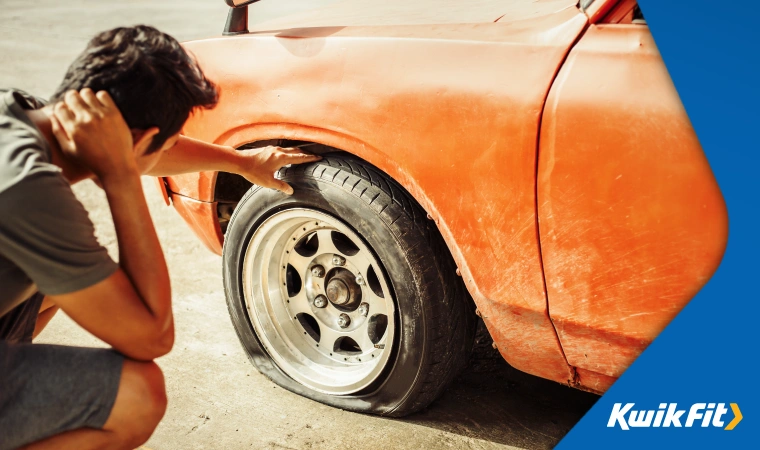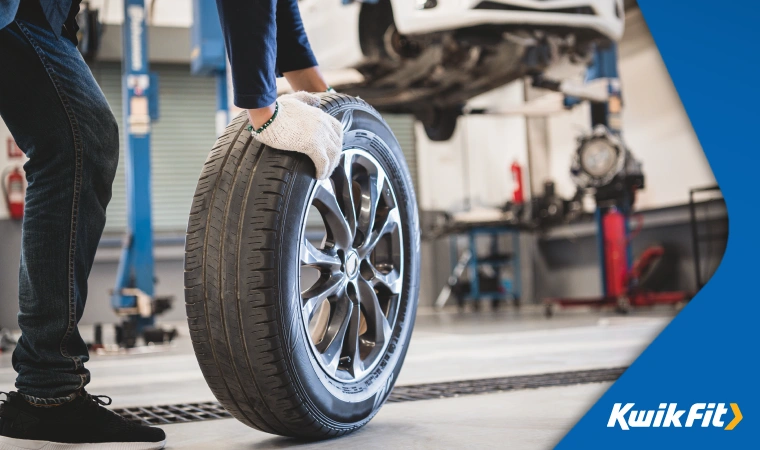Can a Run Flat Tyre Puncture Be Repaired?
Jack Dreyer | Wednesday 19th October 2022 12:30pm

Whenever and wherever it happens, getting a puncture can be a pain. As well as potentially spoiling your plans, it could blow a hole in your finances. Itís especially frustrating if it happens to a tyre thatís practically new. To try to reduce costs, your first thought may be to repair rather than replace the affected tyre - but what if itís a run flat tyre, rather than a regular model?
Here, we take a look at what sets run flats apart from other tyres, and how this impacts whether or not you can have them repaired.
What exactly are run flat tyres?
The feature that distinguishes run flat tyres is their specially reinforced sidewalls. This characteristic means that even when they are punctured, you can carry on driving on them for a limited number of miles and at a reduced speed. Usually, you can drive for a maximum of 50 miles at a top speed of 50mph on a punctured run flat, allowing you to get to a tyre centre to assess the damage.
This saves you from having to replace your car tyre at the roadside (which may be difficult or even dangerous) or call out emergency roadside assistance. As an added bonus, because you donít have to carry a spare tyre with you in your car, you can benefit from a larger boot space and - thanks to the reduced weight - greater fuel efficiency and mileage. Importantly, run flats also make it easier to keep control of your vehicle in the event of a puncture, reducing the risk of an accident.
Because of their reinforced sidewalls, it can be difficult to tell that youíve got a puncture if youíre driving on run flats. This means all vehicles that use these tyres must also have a tyre pressure monitoring system (TPMS) fitted. Often, an alert from this monitoring system is the only thing that indicates to drivers that they have a puncture.
If your car has run flats and your TPMS warns you that youíre losing pressure in one or more tyres, itís vital that you stick to the speed limit and mileage specified by the manufacturer and get your tyres changed as soon as possible. Your handbook will give you the details of these restrictions.
The fact is, run flat tyres arenít designed to be used over long distances or high speeds after being punctured. Even though they may look fine to the untrained eye, itís essential that you get to a tyre centre and have a specialist technician check them out. If you donít, thereís a danger youíll damage the wheel itself, which is much more costly than replacing your tyre.
Can I get mine repaired?

Unfortunately, almost certainly not. The vast majority of tyre technicians wonít agree to repair a run flat; instead, theyíll offer to replace it.
Tyre manufacturers actually advise not to repair these tyre models for a very important reason. Thanks to their reinforced design, it can be difficult to spot any secondary damage that has occurred as a result of a puncture. In other words, any potential harm to the tyre wall may be masked by the added strength of the tyre. Simply by assessing the tyre, it can be impossible to tell if a motorist has continued to drive their car at an unsafe speed or for too many miles after the puncture occurred, therefore compromising the overall structure and safety of the tyre.
Because of this uncertainty, carrying out minor repairs to run flats can be a waste of money to the vehicle owner or, even worse, it can prove to be dangerous. At Kwik Fit, we donít offer to repair run flat tyres for this reason. In order to comply with manufacturer guidance and to help keep our customers safe, we replace punctured run flats instead.
What's my next step?

If you have a run flat tyre and your TPMS is warning you that you may have a puncture, itís important to get your tyres looked at by a professional as soon as you can.
At Kwik Fit, our technicians are on hand to provide a free tyre safety check and can tell you if you need a replacement. If itís convenient for you and you can reach your nearest fitting centre without exceeding the mileage limit on a punctured run flat, simply pop in with your car to speak to our experts. If you canít reach us though, donít worry. We also offer a mobile fitting service, meaning we can come out to your home, workplace, or another location of your choosing at a time that suits you.
Replacing a run flat tyre may not cost you as much as you think. We offer a wide range of cheap run flat tyres with options to suit all budgets, and should have exactly what youíre looking for.
A warning
Unfortunately, some drivers mistakenly think that because theyíre called run flat tyres, these tyres are designed to keep functioning as normal even with a puncture. For the reasons explained above, itís really important that you donít fall into this trap. If you try to keep using a punctured run flat as you would normally, you could land yourself with a bigger bill than simply replacing a tyre - and you might put your safety and the safety of others at risk.
If youíd like to find out more about these tyres, including their advantages and their limitations, donít hesitate to get in touch.
Any facts, figures and prices shown in our blog articles are correct at time of publication.
Featured Articles
Is it Illegal to Drive With One Headlight?
Saturday 19th July 2025
Wondering if itís illegal to drive with one headlight? Learn about the safety risks and penalties of illegal blown bulbs and why you should fix them promptly.
Air Con in EVs & Hybrids: Experts Answer Your Questions
Monday 30th June 2025
Does air con drain EV batteries? Can you use the air con while charging an electric car? Find out the answers to these questions & more from Kwik Fitís experts.
Why Is Your Car Making a Noise? Fixes & Tips
Friday 13th June 2025
When your car starts making unexpected noises, it can certainly be quite disconcerting; it may be nothing to worry about, but hereís what you need to know.









